You can now add Healthify as a preferred source on Google. Click here to see us when you search Google.
Dengue fever
Also called breakbone fever
Key points about dengue fever
- Dengue fever is a viral infection that’s spread by infected mosquitoes.
- It’s widespread across the Pacific Island countries, Asia, Central and South America, and Africa.
- The common symptoms are fever, severe headache, pain behind your eyes, pain in your joints and muscles and a rash.
- Get immediate medical attention if you have these symptoms or you're unwell after travelling to dengue-affected areas.
- Call Healthline (free in Aotearoa New Zealand) on 0800 611 116 for advice.
- If you’re travelling to a dengue-affected area, you should protect yourself from mosquitoes to reduce your risk of dengue.
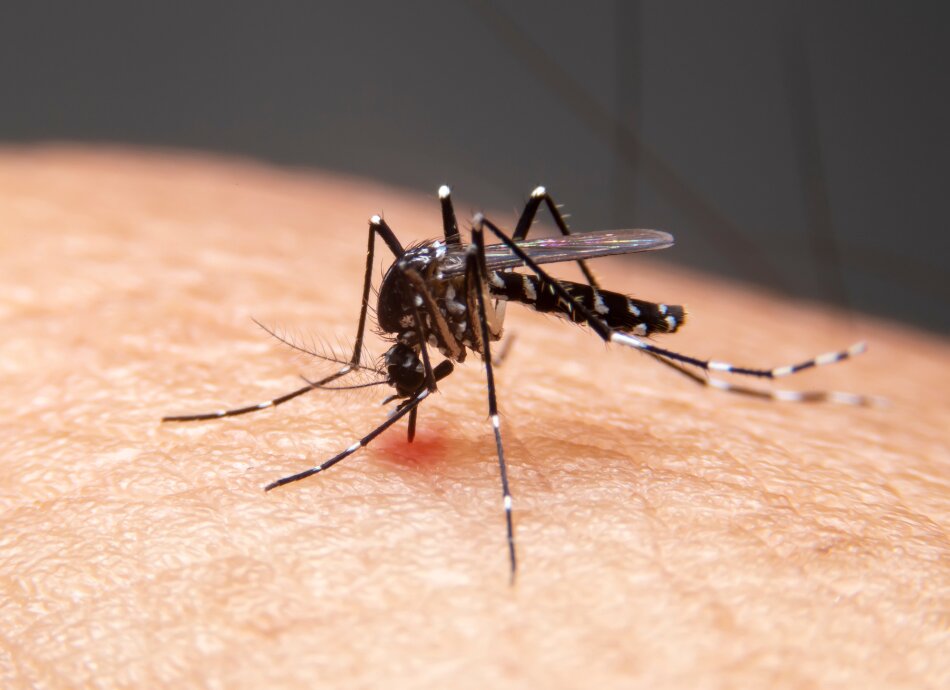
January 2026: There is an ongoing dengue outbreak in the Pacific, especially affecting the Cook Islands, with continuing presence in Samoa, American Samoa, Kiribati, Nauru and Tuvalu.
So far there are 86 confirmed cases in Aotearoa New Zealand, most linked to recent travel to the Cook Islands.
To avoid dengue when travelling outside Aotearoa New Zealand, take precautions to prevent mosquito bites. Read more below.
If you're unwell after travelling to a dengue-affected area, see your healthcare provider or call Healthline (free in Aotearoa New Zealand) on 0800 611 116 for advice.
Factsheets
Health New Zealand | Te Whatu Ora dengue fever factsheets are available in English [PDF, 316 KB], Samoan [PDF, 245 KB], Niuean(external link), Fijian(external link), Cook Islands Māori(external link) and Tongan(external link).
Dengue fever is a viral infection that’s spread by infected mosquitoes. It’s widespread across the Pacific Island countries, Asia, Central and South America, and Africa.
Most cases of dengue are not life threatening. However, in rare cases, dengue fever can develop into a severe form called dengue haemorrhagic fever or dengue shock, which can cause death. If you’ve previously had dengue, you’re at increased risk of dengue haemorrhagic fever.
If you travel to a dengue-affected country multiple times, you’re at risk of getting dengue fever more than once.
In Aotearoa New Zealand, there’s no vaccination to protect travellers against the dengue fever, so preventing mosquito bites is the best form of protection. If you’re travelling to dengue-affected countries, use insect repellent, wear protective clothing and stay in places where there are mosquito screens on windows and doors.
Dengue fever is caused by the dengue virus which is spread through the bite of certain mosquitoes (Aedes mosquitoes). People get dengue when they’re bitten by a mosquito carrying the virus.
These mosquitoes are common in Pacific Island countries, Asia, Central and South America, and Africa, and are often found in cities and urban areas. They’re not found in Aotearoa New Zealand so dengue can only be picked up if you’ve been in a dengue-affected area.
There are 4 types of dengue viruses known to cause disease in humans. If you're infected with 1 type of dengue you'll only become immune to that type. You won’t be immune to other types of dengue and could be at higher risk of severe disease if you’re infected with another type later.
Dengue fever can't be spread directly from person to person.
Symptoms of dengue fever usually develop 4 to 7 days after being bitten by the infective mosquito, although they can start anywhere from 3 to14 days after being bitten. Symptoms usually last from 2 to 7 days. Some people don’t have any symptoms.
The common symptoms of dengue are:
- sudden fever
- severe headache
- pain behind your eyes
- feeling very tired
- muscle and joint pain (ankles, knees, elbows)
- rash on your arms and legs, severe itching, your skin peeling
- nausea (feeling sick) or vomiting (being sick).
Dengue fever is sometimes described as being similar to a severe flu-like illness, and may also be referred to as ‘breakbone fever’ because of the severe muscle and joint pain. Generally, younger children and those with their first dengue infection have a milder illness than older children and adults.
Get checked if you’re unwell during your trip, or in the first 3 weeks after travel to dengue-affected areas such as the Pacific Island countries, Asia, Central and South America and Africa, or call Healthline (free in New Zealand) on 0800 611 116 for advice. When you seek care, make sure you tell them that you’re a returning traveller, as this helps them to consider infections that are uncommon in Aotearoa New Zealand.
Severe dengue or dengue haemorrhagic fever
In rare cases, dengue fever can worsen to severe dengue, which can result in shock, severe bleeding, organ failure and even death. You’re at greater risk of this if you’ve had dengue fever before and are then infected with a different strain of the virus. This is important if you make a number of visits to a dengue-affected country over the years, as you’re at risk of picking up dengue fever each time you visit. Initially, severe dengue has the same symptoms as dengue fever, but after a few days, your condition quickly gets worse.
- severe stomach pain or persistent vomiting
- red spots or patches on your skin
- significant bleeding or bruising, such as:
- bleeding from your nose or gums
- vaginal bleeding
- signs of bleeding in your stomach, such as vomiting blood, blood in your poo or black, tarry poo
- drowsiness or irritability
- confusion
- dizziness
- pale, cold or clammy skin
- difficulty breathing.
See a healthcare provider immediately if you think you may have dengue fever and tell them about your travel. Early diagnosis can help to reduce the risk of complications. Your healthcare provider will ask about your symptoms and recent travel, and will do a physical examination. Blood tests are required to diagnose dengue fever.
Most people infected with dengue will only have a mild illness and may not even be aware they’ve been infected. There’s no specific medical treatment for dengue.
Your healthcare provider may advise you to:
- have bed rest
- drink plenty of fluids
- take medicines such as paracetamol to reduce fever and ease pain.
Don’t take aspirin or non-steroidal anti-inflammatory agents, such as ibuprofen, naproxen or diclofenac, because they can increase the risk of bleeding.
The illness usually lasts up to 10 days, but full recovery may take some time. You may feel tired and depressed for weeks.
If you have warning signs of severe dengue, you’ll need to be admitted to hospital. Treatment may include intravenous drips for fluid, electrolyte replacement, and treatment to improve blood clotting.
For New Zealand travellers, there’s no vaccine to prevent dengue. The best way to avoid infection in areas where there are dengue-carrying mosquitoes is to protect yourself against being bitten and to reduce potential mosquito breeding sites (see below). If you’re living in or travelling to a dengue-affected area, whether you’ve been previously infected or not, you should take precautions to prevent being bitten.
A new vaccine for dengue has been approved in some countries where dengue fever is common. It’s only useful for people who have previously been infected with dengue fever, as it can actually increase the risk of severe dengue for people who have never had the disease before. This vaccine is not available in Aotearoa New Zealand.
Protection
Although the most common time for mosquito bites is early morning and late afternoon, dengue-carrying mosquitoes bite all through the day so protect yourself day and night.
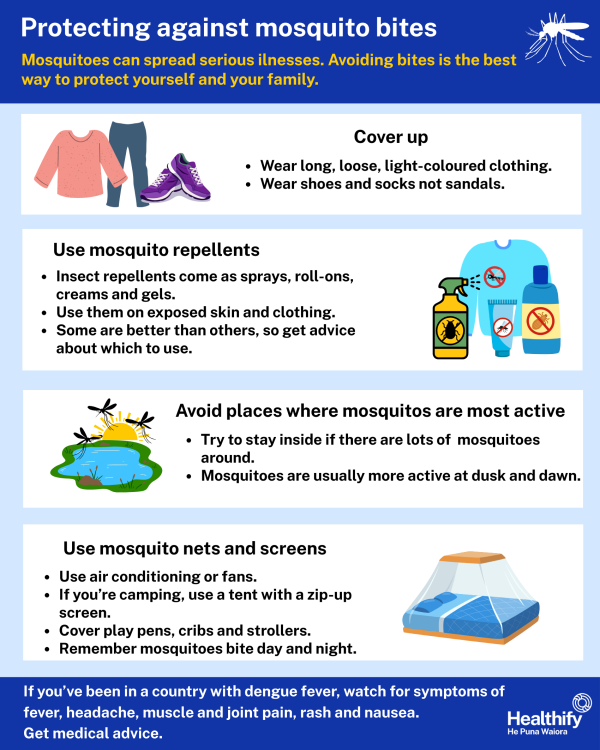
Image credit: Healthify He Puna Waiora
Protect against mosquito bites indoors
- If possible, stay in places with mosquito screens on doors and windows.
- Use insect sprays.
- Use an insect repellent on your skin (see below).
- Use mosquito coils or other repellent devices.
- Use a mosquito net over your bed at night if there’s one available. New bed nets often have insecticide already on the net but, if not, you can spray the net with insecticide.
- Turn on air conditioning if you have it and close all windows and doors – this is very effective at keeping mosquitoes out of the room.
Protect against mosquito bites outdoors
- Wear an insect repellent cream or spray containing no more than 50% diethyltoluamide (DEET) or 30% DEET for children. Higher concentrations aren’t any more effective and can be harmful. Products containing 20 to 25% picaridin (also known as icaridin) or 30% lemon eucalyptus oil (also known as PMD) can also be used. Read more about insect repellents and how to use them safely.
- When using sunscreen, put the sunscreen on first and then the insect repellent.
- Wear light-coloured protective clothing such as long-sleeved shirts, long pants and hats.
- Wear clothing treated with an insecticide such as permethrin. You can buy clothing that’s already been treated, or you can buy permethrin and treat your own clothes (watch the video below). Permethrin-treated clothing can be washed several times and still provide protection against insects. Don’t use permethrin insecticide on your skin. Regular insect repellent applied to clothes can also provide temporary protection, but it must be reapplied at regular intervals.
- Wear covered shoes rather than sandals.
- If you’re camping, use zip-up screens on tents.
- Avoid areas where mosquitoes are most active.
The mosquito that transmits dengue is commonly found in both urban and rural areas.
Video: How to use permethrin on clothes and gear, gear maintenance, mosquito and tick hiking gear treatment
(Savage Traveler, US, 2023)
Reduce mosquito breeding sites
Dengue-carrying mosquitoes generally breed in stagnant (standing or non-flowing) water found in containers (eg, old tyres, uncovered barrels, buckets) rather than in rivers, swamps, open drains, creeks or mangroves. Dengue is particularly common in urban areas where stagnant water near to homes provides an ideal breeding ground for the mosquitoes.
To get rid of mosquito breeding sites:
- empty any containers that hold water in and around the place you’re staying
- cover all water tanks, cisterns, barrels and rubbish containers
- remove or empty water in old tyres, tin cans, bottles, and trays
- check and clean out clogged gutters and flat roofs where water may have settled
- change water regularly in pet water dishes, birdbaths and plant trays
- trim weeds and tall grasses, as adult mosquitoes use these for shade.
Video: Fight the bite, day and night
Dr Laupepa Va'a from the Ministry of Health talks about how people travelling overseas can avoid being bitten by mosquitoes that might carry diseases such as dengue fever and Zika virus.
(Ministry of Health, NZ, 2018)
Areas often affected with dengue fever include:
- Central and South America
- Asia (including Cambodia and India)
- Sub-Saharan Africa
- Pacific Island nations
- North Queensland, Australia.
Dengue outbreaks can occur anywhere in tropical countries as shown in the map below, so if you are planning on travelling, check the risk level(external link) before you go.
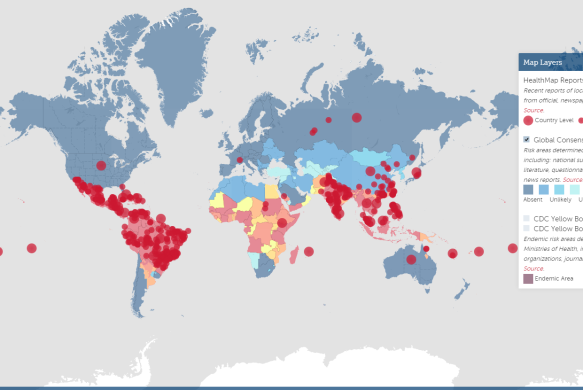 (external link)(external link)
(external link)(external link)
Image credit: HealthMap
Most people with uncomplicated dengue fever recover fully and develop lifelong immunity against the type of dengue virus that caused the infection. However, you may get dengue again if you’re infected with one of the other types of dengue virus.
If you get dengue more than once, you’re at increased risk of severe dengue, which can be life-threatening.
Travel advice(external link) Safe Travel, NZ
Insect repellent (external link)DermNet, NZ
Insecticides and the skin(external link) DermNet, NZ
Brochures
Dengue fever [PDF, 316 KB] Health New Zealand | Te Whatu Ora, NZ also available in Samoan [PDF, 245 KB], Niuean(external link), Fijian(external link), Cook Islands Māori(external link) and Tongan(external link)
Protect against mosquito bites when travelling(external link) CDC, US, 2019
References
- Dengue fever(external link) Auckland HealthPathways, NZ, 2026
- Public health advisory – Dengue outbreaks in the Pacific(external link) Health New Zealand | Te Whatu Ora, NZ, 2026
- Dengue fever outbreak in the Pacific(external link) Safe Travel, NZ, 2026
- Travellers urged to be on alert for dengue with increased cases in the Pacific(external link) Health New Zealand | Te Whatu Ora, NZ, 2026
- Dengue(external link) World Health Organization, 2025
- Dengue fever (external link)DermNet NZ, 2017
Video: Dengue clinical management training (33 mins)
A video from the US CDC outlining important concepts for early recognition, accurate diagnosis and evidence-based management of dengue fever.
(Centers for Disease Control and Prevention, US, 2026)
How is dengue fever transmitted?
Dengue fever is a viral infection that you can get by being bitten by a mosquito that carries the dengue virus.
Can dengue fever be spread from person to person?
Dengue fever is not spread directly from person to person. People become infected with the dengue virus after being bitten by an infected mosquito.
Can dengue fever kill you?
Most cases of dengue fever cause a mild illness. However, if you get dengue fever you’re at risk of getting a severe form of the disease especially if you’ve had dengue more than once. Severe dengue is also known as dengue haemorrhagic fever and can cause death.
Where is dengue fever common?
Dengue fever is common in the Pacific Island countries, Asia, Central and South America, and Africa.
Brochures
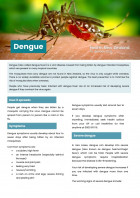
Dengue fever factsheet
Health New Zealand | Te Whatu Ora, NZ, 2024 English, Samoan, Niuean, Fijian, Cook Islands Māori and Tongan
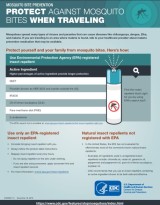
Protect against mosquito bites when travelling
CDC, US, 2019
Credits: Healthify editorial team. Healthify is brought to you by Health Navigator Charitable Trust.
Reviewed by: Dr Grace Lee, FRNZCGP and Clinical Educator
Last reviewed:





